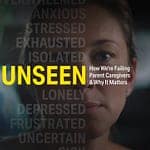Every day, behind closed doors and in quiet moments of sacrifice, millions of us wear the invisible cloak of caregiving. I am one of these caregivers, committed to the relentless daily routine of looking after a loved one. The public often perceives us merely as attendants to the physical needs of the elderly or infirm, a view that scarcely scratches the surface of our lived reality. Through this article, I aim to pull back the curtain on the life of a caregiver, sharing not just my own experiences but also voicing the silent struggles and emotional battles that define our days.
This is an invitation to see beyond the stereotypes and recognize the profound emotional depth, resilience, and unseen challenges we face. Join me as we explore the true essence of caregiving, an endeavor that reshapes hearts, tests limits, and demands more than what is often seen or acknowledged.
My Journey as a Caregiver:
In my journey as a caregiver, I’ve come to understand that this role extends well beyond the expected. As Helen Keller once said, ‘Alone we can do so little; together we can do so much.’ This rings especially true in caregiving, where the collective effort often remains unseen. Caregivers, often family members like myself or individuals dedicated to aiding the elderly, play a pivotal role in our society by attending to the nuanced needs of others. While many perceive us merely as attendants to the daily, medical, and physical requirements—such as ensuring medication schedules are followed or assisting with basic personal care—our role encompasses a vast spectrum of emotional and logistical support.
Despite being a fundamental aspect of both developed and underdeveloped societies, we caregivers frequently find ourselves invisibly shouldering these immense responsibilities without acknowledgment. We are the silent backbone of healthcare, often regarded as superhuman, yet feeling all too human in the face of our daily challenges.
Life of a Caregiver:
Living as a caregiver, I’ve often felt part of an invisible lot. There’s a poignant truth in the saying, ‘To care for those who once cared for us is one of the highest honors,’ yet those of us performing this honor daily seldom hear the question, ‘How are you?’ Whether accompanying family to the doctor or managing hospital visits, caregivers like myself find that attention typically shifts away from us, focusing instead on those we support. This invisibility isn’t due to a lack of presence, but rather a silent expectation of our resilience. We are perceived almost as superhumans, expected to harness strength without betraying signs of fatigue or distress.
Yet, beneath the calm exterior, there are moments of overwhelming exhaustion and fear—fear that showing our vulnerability might somehow lessen the care we provide to our loved ones, such as our elderly parents or grandparents. It’s not just the physical toll that weighs heavily; the emotional burden is profound, yet largely unacknowledged.
A daughter taking on the role of a Caregiver:
As a daughter and a caregiver, I often find myself caught in a whirlwind of doubt and responsibility: Am I doing enough? Am I doing it right? These questions haunt me, especially when the health of someone I deeply care for begins to falter. It’s in these moments that guilt strikes with the force of a storm, wrapping around me, questioning my worth and my actions. Virginia Woolf once poignantly noted, ‘You cannot find peace by avoiding life.’ Yet, in the world of caregiving, peace is a rare commodity, and avoidance is not an option.
The hard truth is that there’s rarely anyone there to guide us through these turbulent emotions or show us how to navigate our guilt. We are often too scared to voice our fears, bottling them up instead, a silence that can erode our well-being. It’s a heavy burden, one that we carry quietly, often too quietly for our own good.
Among the hardest moments as a caregiver are those filled with deep solitude, when you whisper to yourself in the quiet, ‘Have I done enough?’ and hope someone might echo back, ‘You have; now let it be our turn.’ But that echo often never comes. This profound silence from others underscores a harsh reality: society still fails to grasp the full spectrum of what we endure. Each day, we balance on a tightrope of emotional and physical demands, a feat that goes largely unnoticed.
Caring for loved ones with physical ailments already demands everything I have, but it’s the invisible struggles—managing the unpredictable waves of bipolar disorder, the suffocating grip of depression—that stretch my resilience to its limits. These are not just conditions listed in medical books; they are raw, daily realities that bleed into every aspect of life, making every small task a mountainous endeavor.
Virginia Satir once beautifully captured the essence of our journey: ‘Most people think the art of living lies in a fine mingling of letting go and holding on.’ For those of us in the trenches of caregiving, that balance is a relentless challenge—one that demands recognition, not just as an act of survival, but as an act of profound love and dedication.
As we draw the curtains on this exploration of the caregiving world, we are left with a clearer understanding and, hopefully, a deeper appreciation of the silent battles fought daily by countless unsung heroes. Caregivers are not merely supporters; they are the very backbone of day-to-day life for many families, handling challenges with a quiet resilience that seldom receives the applause it deserves.
Let this be more than just a moment of recognition. Let it be a call to arms for communities, policymakers, and individuals alike. We must bridge the gap between understanding and action, ensuring that caregivers receive the practical support and recognition they need and deserve. Whether it’s by advocating for policy changes, supporting a caregiver you know, or simply starting a conversation about the crucial role caregivers play, your involvement can make a tangible difference.
Caregiving is not a role confined to the shadows; it is a profound expression of love and commitment. As we move forward, let us remember that caring for the caregiver is not just an act of kindness—it is an essential, collective responsibility. Together, we can transform appreciation into action, ensuring that no caregiver has to walk their path unseen or unsupported.
In honoring caregivers, we honor the very essence of humanity.




